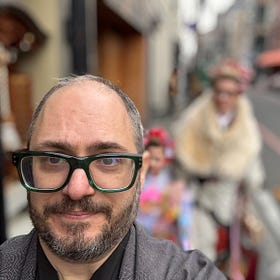The First Commercially Available AI Screening Tool In Psychiatry...is FREE.
Tardive Dyskinesia is a more common than we think, and now there is a tool to pick up that problem.
I’ve been writing about the research colleagues and your editor, Owen Scott Muir, M.D, DFAACAP, have been doing on AI Detection of Tardive Dyskinesia (TD) for a while1. This week, I come with receipts! We finally have the paper on this work published2:
Detecting Tardive Dyskinesia Using Video-Based Artificial Intelligence
In summary, using a video transformer model to detect this movement disorder worked! What follows is a ROC-AUC curve (at 0.89), which is a measure of how well the algorithm performs.
This compares well to prior studies of humans rating TD, by “well,” I mean it’s better than any prior study (when sensitivity and specificity are set = to each other, it’s about 82%. This is better than any prior study by human raters. As we ponder which jobs AI will displace, I have initiated the trend by displacing myself (I was a rater in this trial…and the algorithm outperformed me).
Screening millions of people for a potentially debilitating adverse effect, however, is something we can feel good about automating away:
Our machine learning (ML) model was evaluated using the same data as the reviewers. The model achieved a Cohen κ of 0.51, demonstrating greater consistency than the reviewers’ initial assessments. Furthermore, when utilizing the full dataset, the model’s Cohen κ increased to 0.61, considered a strong and reliable level of agreement, outperforming human raters.
The more data we fed it, the better it got, which is a good thing! What is remarkable, however, to me is how few subjects in the sample allowed the machines to beat the humans at this task—the total sample was n=351.
That is…not that many—the whole thing was done across two sites, and our research subjects were enthusiastic about participating. It provides hope that more and more screening tasks can be accomplished more effectively, faster, and more frequently, allowing clinicians to focus on diagnosis and treatment.
The most exciting part, however, is the most unexpected. This first-in-psychiatry tool is available free of charge for clinicians to use—right now!
It’s available at TDscreen.ai. You can share that link with your doctor, and they can sign up to access it on your behalf. If you are a doctor, you can use it with all your patients. It’s not a scam. It’s not freemium. It’s free. And if you'd like to use it for yourself, here's the link for that.
If you screen positive, the kind of doctor you want to follow up with is a psychiatrist or a movement disorders neurologist. There are treatments available! Some are drugs, and there is even evidence that TMS might help.
Thanks for reading. And please, tell the world! If you would like to schedule an appointment with a doctor on our team at Radial, please click the link below. We aren’t available in every state yet, but we are working on it!
If you’d like to learn more about TD, this newsletter has been on the beat…
This Physician Realizes He Might Have The Movement Disorder He's Been Researching.
The Frontier Psychiatrists is a daily enough health themed newsletter. Today's article I put off. I knew I had to write it, but didn't want to. I have to make an appointment with the doctor. I have to have a conversation with the rest of my team, including the brilliant Anthony Sterns, Ph.D., at
Sterns, A., Larsen, L., Grimm, B., & Muir, O. S. (2022). Remote monitoring and AI for detecting tardive dyskinesia and improving patient outcomes. Gerontechnology, 21.
Sterns, A. A., Hughes, J. W., Grimm, B., Larsen, L., Ma, F., Ranjan, R., ... & Muir, O. S. (2025). Detecting Tardive Dyskinesia Using Video-Based Artificial Intelligence. J Clin Psychiatry, 86(3), 25m15792.








